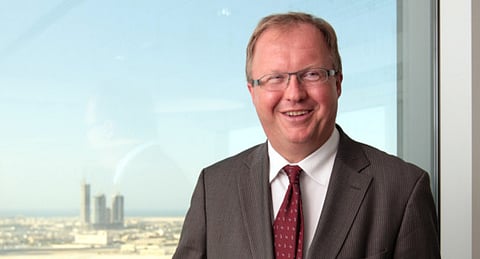Quality equals definite advantage
Ambassador Nikolai von Schoepff talks about UAE-German cooperation in terms of economic and cultural touchpoints

Despite the financial and economic crisis of the last few years, bilateral trade relations between Germany and the UAE have been comparatively high. While German exports to the UAE accounted for €7.5 billion (about Dh36 billion) last year — almost the same level as in 2010 — exports from the UAE to Germany almost doubled to €1.02 billion in 2011.
“We expect Germany to remain one of the five most important trading partners of the UAE in 2012,” says Nikolai von Schoepff, Germany’s Ambassador to the UAE. “As is generally known, innovation and quality, not so much the lowest possible price, are the main characteristics of products made in Germany. If you prize training measures, maintenance, technological progress and product quality, that is, the long-term economic value of the package offered by German companies, German products are very competitive indeed.”
“Take, for example, the decision of Masdar Solar to extend the production of solar panels in Germany, which was taken despite a decrease of German state subsidies for solar panels,” Schoepff says. “I am personally convinced that the UAE, with its striving for worldwide excellence, will see the economic advantage of high quality over lowest price bids in the long run.”
Schoepff, Head of the German Embassy in Abu Dhabi since last year, expects international competition in the UAE to increase in 2013 but is confident that, with the help of the German-Emirati Joint Council for Industry and Commerce (AHK), German firms will master this challenge.
Schoepff notes a broadening of German industry within the UAE, naming the partnership of Etihad Airways and airberlin — Germany’s second-biggest air carrier — as a major development. Another major partnership is between the German hydrocarbon industry and Abu Dhabi National Oil Company (Adnoc) for developing onshore gas fields.
“German industry in the field of logistics and transportation is increasingly active, also with regard to the ambitious plans of a UAE railway,” Schoepff says. He adds that recent opinion polls confirm that Germany is still the preferred European health hub for Emiratis because of its excellent international reputation for quality medical services.
The AHK offers a networking platform for German and UAE business people, and Schoepff believes this reflects the strong economic cooperation between the two countries. The increasing interest in the UAE in Germany has resulted in the opening of an office of the AHK in Munich.
Regarding the finance sector, he says experts in Germany are aware that Islamic banks have stayed on track amid the economic turmoil and that it is worthwhile to explore options to introduce Islamic banking “or certain aspects of it to the financial market in Germany”.
Investment contribution
“There are remarkable investments of the UAE state funds in Germany, for example, in the field of semi-conductors, aluminium, shipbuilding and renewable energy,” Schoepff says, although he admits that in the last 12 months no new major investment was made. “Aabar Investments of Abu Dhabi has recently even sold its shares of Daimler AG.”
Both nations have signed various memorandums of understanding (MoUs), including the implementation of a scholarship programme for exchange students and an agreement regarding the training of medical experts. Since September last year, the UAE Higher Colleges of Technology at Abu Dhabi have run the German-UAE College of Logistics. In addition, three German technical universities now offer a four-year bachelor’s programme in logistics, science and technology.
The two countries are preparing a bilateral maritime agreement. Aviation too plays a major role — it is the main bridge of our bilateral ties, Schoepff adds. “The relevant MoU is of a liberal nature, which opens excellent market opportunities for UAE carriers in Germany [for example, no limitations on the number of flights].”
Schoepff adds that the bilateral agreement to avoid double taxation came into force last year.
UAE insights
Cultural exchanges between the UAE and Germany this year included a ten-day visit to the 62nd Berlin International Film Festival (Berlinale) by 11 Emirati and Arab film-makers, the second Heritage Film Festival and German representation at the Abu Dhabi International Book Fair.
Some experiences that define Schoepff’s term as ambassador to the UAE include: the June visit of the German Federal Minister of Foreign Affairs, Dr Guido Westerwelle, to celebrate the 40th anniversary of the establishment of bilateral diplomatic relations; attending the majlis of General Shaikh Mohammad Bin Zayed Al Nahyan, Crown Prince of Abu Dhabi and Deputy Supreme Commander of the UAE Armed Forces; and the German National Holiday celebrations held last year in Abu Dhabi.
He estimates there are about 12,000 Germans in the UAE. “In general, Germans feel very much at home in the UAE because of the Emirati hospitality, peace and stability of the UAE political system and social balance,” says Schoepff. “There are more than 800 German companies active in the UAE.”
“There is a high esteem for German know-how, experts, technology and products,” he says. “Business in the UAE is a matter of trust and long-standing personal relationships. Germany is proud of this precious trustworthiness.”
Schoepff is impressed by the UAE’s leadership. “What the UAE has achieved in the field of renewable energy, with implementing the Masdar project and outreaching with International Renewable Energy Agency, can serve as an educating example for other nations.”



